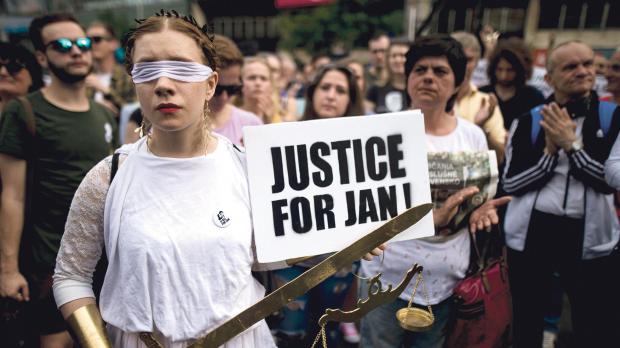On June 15, Slovakia’s first female President will be sworn into office. Zuzana Čaputová, who entered high-level Slovak politics only a few years ago, took the election with nearly 60 per cent of the vote. The vote was regarded by many as a referendum on corruption in Slovakia, with the murder of reporter Ján Kuciak in 2018 serving as a guide for popular resistance to entrenched corruption in the country. Is it the dawn of a new era for politics in Slovakia? asks Patrick J.O. Brien.
When political outsider Zuzana Čaputová surprised European politics by winning 58.4 per cent of the votes in Slovakia’s presidential election – she was polling in single figures just a few months prior to the election – she claimed her victory was one that highlighted the values of humanism, solidarity and truth, and showed that you can win without attacking opponents.
Dr Čaputová’s election was a clear message that a positive campaign can be a winning one – and provided a rare glimmer of hope for liberal politics in central Europe. It was a cry for change – but Dr Čaputová’s victory also comes with high expectations.
“Our nation and society called for change and I have offered them my service,” she told the Times of Malta. “The change is needed for various reasons, but most likely because people are just tired of ‘old politics’, corruption, and not getting the justice they expect. I also feel that I can act as a bridge between conservatives and liberal opinions.”
Her victory was also evidence of people’s dissatisfaction with the status quo and how this can lead to the election of more progressive leaders.
“People vote for extremist or populist parties out of frustration. I can put myself into that situation – I can even agree on the diagnosis of the whole situation. However, my solutions are constructive. We have to try to listen and have a dialogue in order to achieve the best outcomes.”
If you want to win an election, I believe there is really no need to use a populist language or to work with the emotion of fear
That dialogue goes counter to fake news, hatred and conspiracy theories.
“If you want to win an election, I believe there is really no need to use a populist language or to work with the emotion of fear, using threats as manipulation. I have never used these methods and I think people appreciated that.
“My strategy to counter fake news on social media was to publish all fake items on my fan page while countering them with the truth. There was really nothing to hide and through all my campaign I have answered all questions very openly.” Dr Čaputová – who at 45 will also be Slovakia’s youngest-ever President – believes that through her new role, she can usher in positive changes.
“The President should be inspiring, motivating and an active leader who connects society,” she said.
“Change in society can only happen by cooperating with other public authorities and engaging with the public itself. This is also closely connected to the trust people have in politicians. I hope I manage to improve this trust.”
 Demonstrators attend a protest 'For a Decent Slovakia' in Bratislava, Slovakia. Photo: Vladimir Simicek/AFP
Demonstrators attend a protest 'For a Decent Slovakia' in Bratislava, Slovakia. Photo: Vladimir Simicek/AFPThis also depends on her transition from being a civil activist to Slovakia’s President. “My transition from activist to politician started when I became vice-chairman of the Progressive Slovakia political party. So, I think I am fully prepared for this new role – and during my office, I can also rely on my future advisers and team.”
Slovakia’s first woman President built her campaign on fighting corruption.
Last year’s murder of investigative journalist Jan Kuciak and his fiancée put the issue of political corruption at the forefront of public discussion in Slovakia.
Parallels have been drawn between Mr Kuciak’s murder and that of Maltese journalist Daphne Caruana Galizia in 2017.
“I know the story from the news and it is a real tragedy,” Dr Čaputová said.
“This brutal act has a very similar political context followed by general failure of the State and political representatives. I really hope we will find justice in the end,” she said.